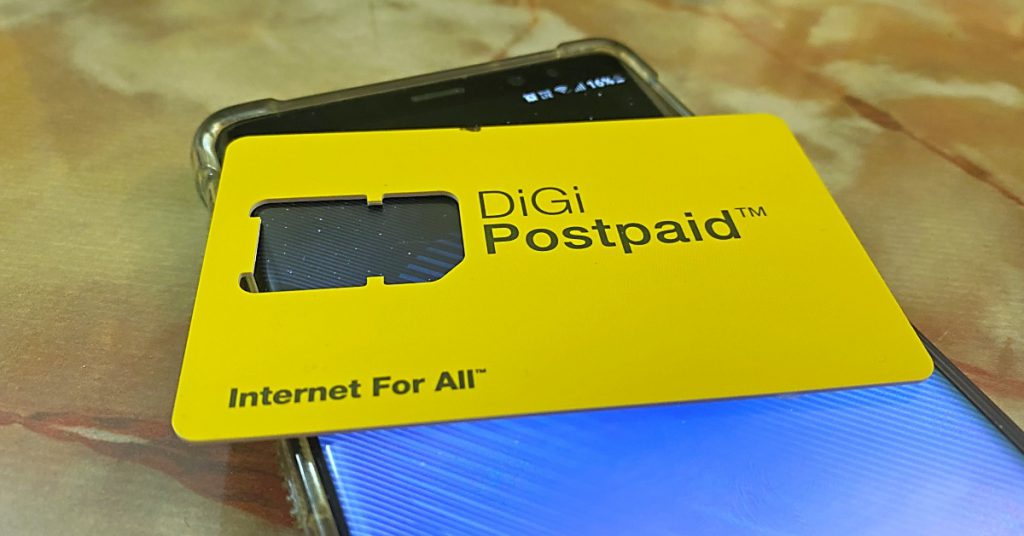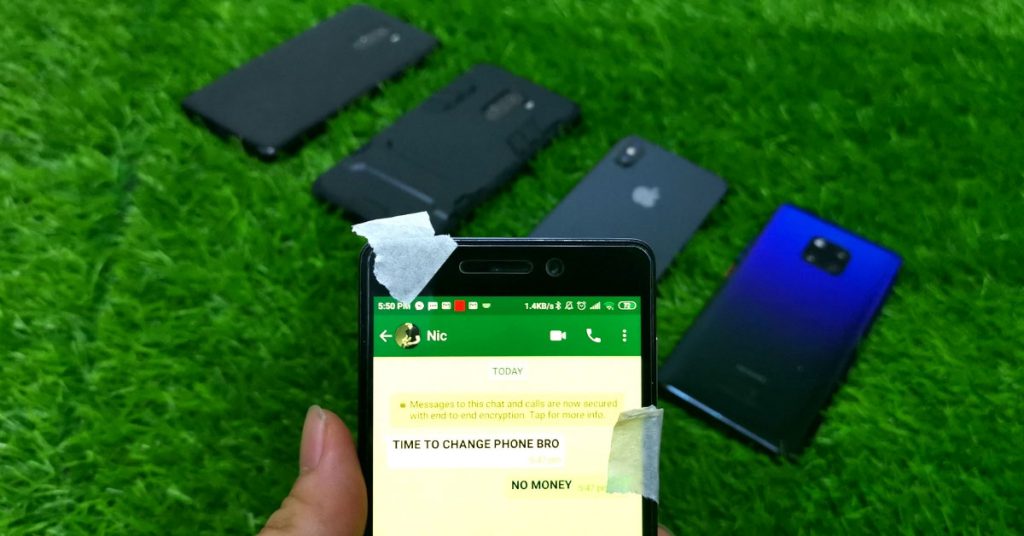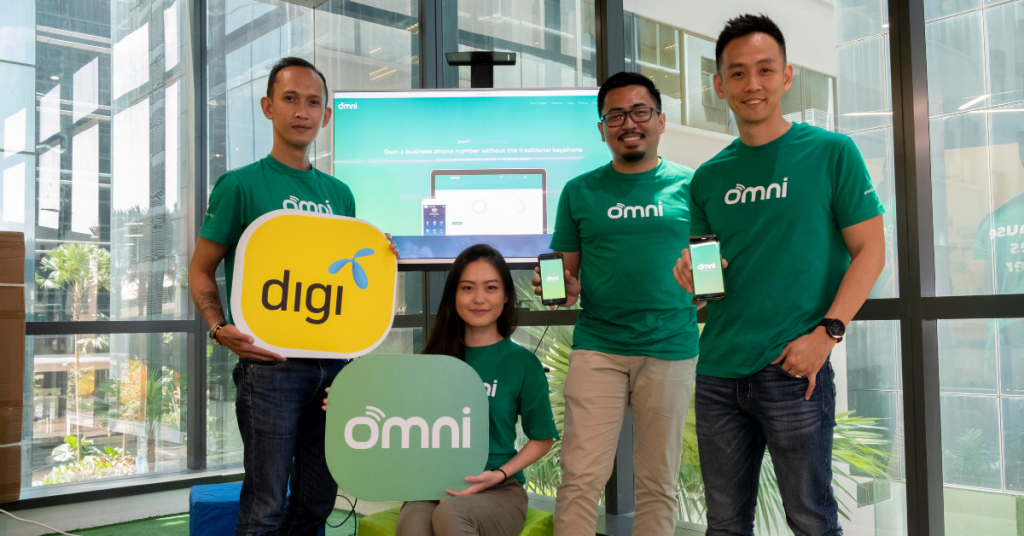Digi Has A New Postpaid Plan, Here Are 4 Key Facts If You’re Thinking Of Switching Things Up

[This is a sponsored article with Digi.]
In March 2020, internet traffic went up by 23.5% during the first week of the Movement Control Order (MCO).
The increased traffic and slow down of the internet forced many Malaysians to use their mobile data to stay connected to their families or study and work online. Weekly mobile data consumption shot up by 30% too during March until early May.
With more citizens relying on mobile internet during the pandemic, Digi, one of the largest telcos in Malaysia has decided to step up. They revamped their postpaid offerings, giving users more value, and a fast and easy package no matter their hobbies.
Here are five main points to take note from this updated package.
1. Digi’s New Postpaid Plans Now Start At RM40/Month
Digi’s new postpaid plans come with a renewed pricing, starting from RM40 a month. This plan entitles you to 10GB of all-access mobile internet service, with unlimited calls to all Malaysian networks at no extra charge.
Based on a market analysis by Ookla, Digi was the fastest mobile operator in Malaysia for the 2nd half of 2020. With the brand’s new revamped all-access internet service, you’ll be getting a fast mobile internet service without any restrictions, even on the weekends, which would be optimal for those off-work PUBG gaming sessions.

2. There Are Free Add-Ons To Choose Based On Your Lifestyle & Data Needs
Signing up for Digi’s new postpaid plans gives you access to choose free add-ons. You’ll also get better deals with plans above Digi Postpaid 60.
For example, with Digi Postpaid 60, you’ll get 25GB of internet and unlimited calls every month. But since starting your Netflix binge, you now need more data. You can opt-in for an additional 10GB of internet monthly, for free.
Alternatively, if you’re a mobile gamer that often spends on monthly gaming passes, you could go for the add-on which gives you a RM5 monthly rebate on your subscriptions on EasyAdd, Google Play or App Store at no extra charge.
Note: You will need to sign a 12 or 24-month contract with Digi to be eligible for these add-ons. Alternatively, there are add-ons that you can pay for, to get additional mobile data. Each user is limited to 1 add-on.

With Digi Postpaid 60 and above, you can get a Gadget SIM for RM10 a month, which gives you an additional SIM card for your gadgets, a discount of up to RM30 a month on Digi’s Fibre Broadband, or a monthly rebate of RM10 for the Digi Mobile Broadband package.
3. Subscribe For Additional Family Lines At A 50% Discount
Primary line users on Digi’s new postpaid plans can get additional supplementary lines starting from RM20 per month.
Example Scenario: You’re a dad of two, so you’ll need a total of 4 lines. You only use the phone for internet surfing and work-related communications, while your wife only uses her phone for social media and YouTube videos.
As for your kids, they can be seen either binging on a new K-drama or a television series or slaying monsters in Genshin Impact.
To get the best deals for your data-heavy kids, you go for the Digi Postpaid 60 Principal plan as you can share your internet quota with your kids if they need it.
Here’s what you’ll need to pay: RM60 for 25GB of internet (Primary), RM20 for 10GB of internet (Supplementary), and two RM30 for 25GB of internet (Supplementary). So for a family of four, all you need to pay is RM140 a month.
If you enable auto-billing via the MyDigi app (Android & iOS), you can get 5% off your bill too.
4. Get Access To New Phones With Monthly Payments
If you’ve been itching to get your hands on the latest phones, Digi’s PhoneFreedom 365 gives you the chance to do so, with zero upfront payment and a zero-interest instalment plan. Digi also lowered the commitment for PhoneFreedom 365 from Digi Postpaid 90 to Digi Postpaid 60 as well.
You can get the iPhone 12 Pro Max through Digi for RM188 a month, but you’ll need to sign up for the Digi Postpaid 120 plan to be eligible for this.
So by paying RM308 a month, you’ll be getting 65GB of all-internet access, unlimited calls to other Malaysian numbers and a new phone. Like other Digi PhoneFreedom 365 plans, you can switch up and get a new phone by the 18th month of your payment.
Also Read: CIMB Tap n Pay Turns Android Phones Into Contactless POS Terminals For Merchants
This Is How Often M’sian Millennials Ditch Their Old Phones For A Sexier Model

- We speak to Malaysian millennials about changing their smartphones and how long they wait before they switch up.
You might have come across someone who switches their smartphone everytime a new model is released.
But looking at top-range smartphones these days, how is everyone affording these crazy prices? It’s not a surprise to see them go above RM4000.
While some may argue that regularly switching mobiles is largely a case of FOMO (Fear Of Missing Out), others insist that the technological advancements in mobile smartphones make them worth the frankly incredulous prices from today.
We conducted a survey of approximately 50 Malaysian millennials to see how often Malaysians actually change their phones, and the thinking behind it.
Till Death Do Us Part
The vast majority of respondents answered that they only ever change phones when their previous phone stops working. This is unsurprising, as many Malaysians cite budget as the main issue when it comes to switching up their phones.
Mei Yi explains, “I can’t justify paying for a new one when I feel I have a lot of expenses to cover. And yes, the new phones are gorgeous, but a lot of the specs and features they have are ‘wants’, not ‘needs’.”
It isn’t exclusively a financially-based decision, however. Another respondent, Fud, said that it all depends on the needs of the situation. “If it’s for work, it’d be better to upgrade. But in my opinion, it’s way better to save up for other important life needs.”
This is in stark contrast with the thinking of other respondents such as Dave—he feels that the right time is whenever the technology in his current phone is outdated.
Some throw logic out of the window entirely. Sarah explains that she’d prefer to change her phone every 2 years because she gets a high/rush out of using the new model.
Jen cites one of the best things about switching to a brand new phone is the increase in capabilities of the smartphone. “Performance and specs have come in leaps and bounds since my last phone.”

However, many of the respondents didn’t regret making the switch once they had changed up their smartphones. One respondent described the best thing about changing phones as, “Literally everything was an improvement, I’d say. Most importantly, I bought my previous Note 3 for RM3000+ in 2013, but my new Nova 3i only cost me RM389. Value for money.”
What’s The Verdict?
Malaysian millennials aren’t quite as frivolous as some say they are.
While there are some who still fork out big sums every year for the latest and best version on the market, most millennials still consider budget a reason to hold off from enjoying the perks of a brand new phone.

No matter if you’re considering an Android flagship smartphone that can go from RM2,500 to RM4,000 or an iPhone that can cost up to RM5,000, you’d still need to fork out a big sum.
Thankfully, there are other options now for you to look at if you’re itching to try out all these new exciting smartphones with less financial worries.
Digi has announced an enhanced PhoneFreedom 365 plan that lets you experience a wide range of smartphones, including new releases like the upcoming Samsung Galaxy S10 Plus, the iPhone XS Max, and the Huawei Mate 20 Pro.
New and existing Digi users can both enjoy this plan where you can own the phone and pay monthly instalments at 0% interest, with no upfront payment required.
You can get your hands on phones like the Huawei Mate 20 Pro for as low as RM68/month or the newly launched Samsung Galaxy S10+ for as low as RM97/month.
Compared to other telcos where you could end up paying around RM500 to RM1,000 more for your phone overall, Digi tells us that theirs is the most valuable phone ownership plan currently on the market.
In addition to that, there will be free phone upgrades so you can keep up to date on the latest smartphone trends and models.
If you’re worried that your phone could face accidental or liquid damages, the plan includes a free phone protection deal called Digi Shield which basically covers and protects your phone.

The Digi PF365 is available to all existing and new Digi postpaid with 4 different plans to choose from—including one with a massive 200GB internet quota that also comes with free roaming and IDD.
So whether it be to stay on trend or your phone is on its last leg, plans like Digi’s PhoneFreedom 365 is something you can check out without making your wallet feel too terrible.
- You can find out more about Digi PhoneFreedom 365 here.
Also Read: Do Business Lunches Actually Help In Closing Client Deals? We Ask M’sian Entrepreneurs.
This article is written in collaboration with Digi.
Businesses Spend Thousands On Their Phone Systems—This Alternative Costs Only RM60/Month

- Digi created Omni as an affordable all-in-one solution for corporate communication needs.
- The service targets SMEs, startups, freelancers, and others who are looking for a business phone system.
- The app was officially released on 2 August 2018.
One of the first major obstacles that small businesses encounter during their developmental stage is the cost of starting up, like setting up a company hotline for customers and clients to contact them.
Traditionally, PBX or PABX systems can cost up to thousands in ringgit so many entrepreneurs resort to other options, such as passing out their personal phone numbers.
Dictionary Time: PBX, or Private Branch Exchange, is a private telephone network used within a company or organisation. Users can communicate internally (within their company) and externally (with the outside world), using different communication channels like Voice over IP, ISDN or analogue.
Digi Telecommunications Sdn Bhd addresses this issue with the release of the Omni Hotline—a virtual business phone system that provides an innovative alternative to the traditional PBX/PABX system.
Targeted but not limited to SMEs, startups, and freelancers, the Omni Hotline functions as a full-fledged business phone system, only without the added costs that come along with hardware and installation of physical units in the office.
This is because it’s all mobile phone-based, and comes with an app for managing it too.
Omni Product Lead, Eddy Han mentioned, “The idea for Omni came from the difficulties and challenges that small businesses face with getting a fixed office phone system.”
“With the rise of a lot of startups in the market who’re working in co-working spaces, acquiring a fixed number is actually a challenge,” said Eddy.
How It Works
The obvious downside to entrepreneurs passing out their personal numbers or opting for mobile numbers as their actual business number is a certain lack of credibility.
The business prefixed number that comes with all Omni numbers is a big plus, with SMS capabilities available as well. Sending SMSes is simple enough with the app—recipients of the text messages see the business prefixed number as opposed to your mobile number, with up to 200 free SMSes available depending on the package you’ve chosen.
In a nutshell, picture this: your customer calls a company number with a landline prefix, something like 03-80111234 (you get to choose from the available numbers when signing up), and is greeted by the Virtual Receptionist who lists out the extensions available.
In a real situation, these would probably be departments within your company. From that point, you can select an extension in order to specifically reach someone in the department whereupon you’ll be patched through to that person’s mobile phone.
One of the primary features of Omni is the Virtual Receptionist that works using “Interactive Response”.
This works by keying in custom messages on the app that are (almost) flawlessly repeated by the Virtual Receptionist using text-to-voice technology.
Most of the settings were adjusted on either the online dashboard or the user-friendly app itself.
“The product is very easy to configure, as easy as setting up a Spotify or Netflix account,” added Eddy.
In case you are a little commitment-phobic, Omni Hotline works on a monthly subscription basis, with 0 setting-up cost. This means you can pull out off the package in the same way you would with a personal line.
[caption id="attachment_648626" align="alignnone" width="700"] Image Credit: Digi[/caption]
Image Credit: Digi[/caption]
However, this is not something that the Digi team usually encounters. Eddy revealed that over 90% of their customers not only stayed with Omni, but upgraded from the basic plan to the plus plan after only a couple of weeks.
While mainly targeted toward smaller-sized companies, Omni is not only limited to SMEs.
Larger companies may choose to use the Omni Hotline as a way to handle customer-care enquiries, or even as a secondary backup option in case the main system goes down.
Eddy added, “We have clients that use Omni in high-turnover departments and Omni as an alternative for customer support in case they are not in the office.”
Given that the entire system works on a network of mobile phones, the ease of use and practicality is what draws most people onto the network.
With the stated aim of improving business communication for SMEs and entrepreneurs, the challenge of adapting Omni for large corporation use is one that would need a certain degree of creativity.
“For larger organisations, basic Omni services might not be able to cater [to] their needs and that’s why it would be best for us to meet them to understand their requirements and customise a plan for them.”
“You can think of it as PABX 2.0.”
Ever had to call a colleague over while covering the office telephone mouthpiece? Chances are, you have—but a traditional PABX solution would normally cost way too much, especially from a SME point of view.
Omni comes with the added benefit of not needing any hardware or installation; the only steps required are the app download and registration on the Omni website.
Personally speaking, I enjoyed the ‘after office-hours’ feature, whereby you are given the option to tweak your preferences to send callers straight to voicemail. Not an auto-option you’d have available to you, if you were using a mobile number.
You’ll still be able to monitor the activity on your app in real-time, so this means that callers won’t slip through the cracks.
Omni also boasts of a voice-to-text technology to produce a transcription of voicemails, which will be immediately emailed to you.
Our team took a while trying this feature out, in order to see if this was consistent enough in a real-world setting, where people in Malaysia speak with a plethora of different accents.
The transcriptions, sent to my email a mere 10 to 20 seconds after the voicemails were recorded, were relatively accurate, especially given that the we spoke naturally and were in a standard (chatty) office environment.
So, Just A PABX System Then?
Not quite. The Digi Omni team explained how startup founders from India even utilised Omni by using the app to pick up calls when overseas, in order to avoid roaming charges.
The business prefix being a 03 number, this provides an affordable alternative to roaming charges, while on the caller’s side, the business number is displayed on the call screen.
“For RM2 a day, for the basic plan, our customers are getting quite a lot of features that they can leverage through Omni. Normal landlines would require RM185, and almost up to RM2,000 for PABX.”
Taking Over The Future
The Virtual Receptionist, already negating the need to actually hire an actual human receptionist, is seemingly one for the future.
Eddy shared his opinion that the concept will indeed supersede the traditional PBX systems, at least for small businesses.
As for larger corporations that have different needs, the Omni concept has a plethora of applications that’d come in handy as well, though there are some adjustments that might have to be made to accommodate them.
- You can download the app for Android and iOS devices here.
- For more information or if you’d like to book a consulting session, you can check out the official website here.
This article is written in collaboration with Digi and Omni.
Also Read: I Bought Items From Japan, USA, And UK And Only Paid RM10 For Shipping
Feature Image Credit: Digi






